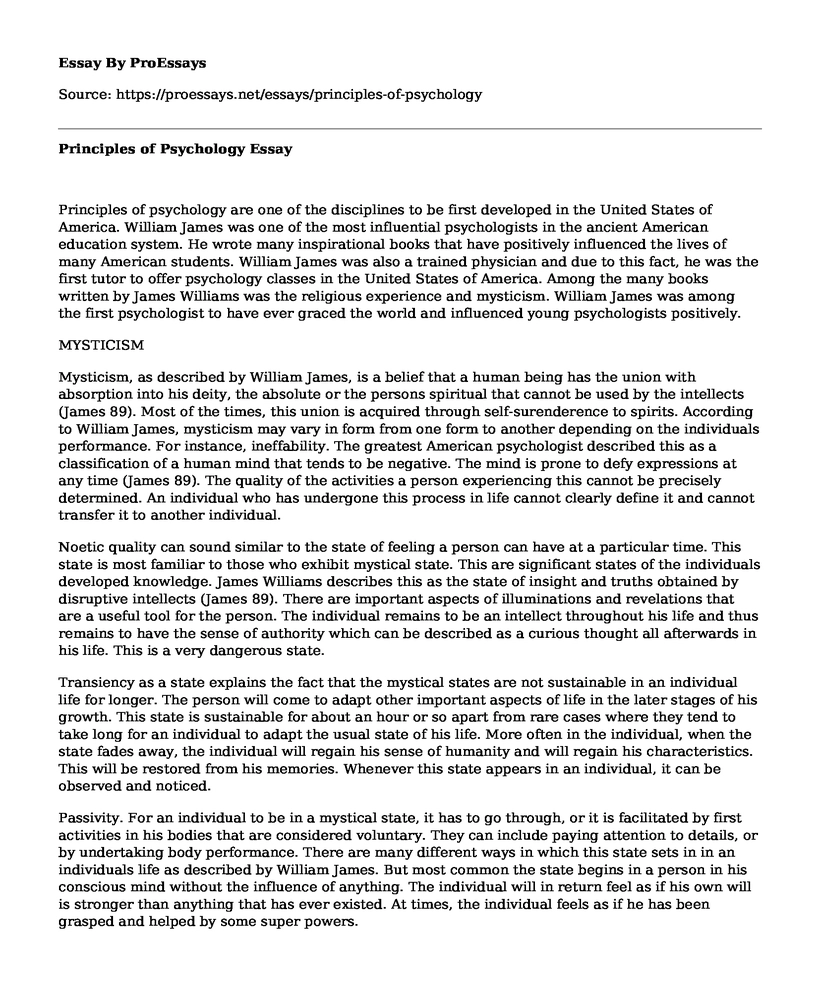Principles of psychology are one of the disciplines to be first developed in the United States of America. William James was one of the most influential psychologists in the ancient American education system. He wrote many inspirational books that have positively influenced the lives of many American students. William James was also a trained physician and due to this fact, he was the first tutor to offer psychology classes in the United States of America. Among the many books written by James Williams was the religious experience and mysticism. William James was among the first psychologist to have ever graced the world and influenced young psychologists positively.
MYSTICISM
Mysticism, as described by William James, is a belief that a human being has the union with absorption into his deity, the absolute or the persons spiritual that cannot be used by the intellects (James 89). Most of the times, this union is acquired through self-surenderence to spirits. According to William James, mysticism may vary in form from one form to another depending on the individuals performance. For instance, ineffability. The greatest American psychologist described this as a classification of a human mind that tends to be negative. The mind is prone to defy expressions at any time (James 89). The quality of the activities a person experiencing this cannot be precisely determined. An individual who has undergone this process in life cannot clearly define it and cannot transfer it to another individual.
Noetic quality can sound similar to the state of feeling a person can have at a particular time. This state is most familiar to those who exhibit mystical state. This are significant states of the individuals developed knowledge. James Williams describes this as the state of insight and truths obtained by disruptive intellects (James 89). There are important aspects of illuminations and revelations that are a useful tool for the person. The individual remains to be an intellect throughout his life and thus remains to have the sense of authority which can be described as a curious thought all afterwards in his life. This is a very dangerous state.
Transiency as a state explains the fact that the mystical states are not sustainable in an individual life for longer. The person will come to adapt other important aspects of life in the later stages of his growth. This state is sustainable for about an hour or so apart from rare cases where they tend to take long for an individual to adapt the usual state of his life. More often in the individual, when the state fades away, the individual will regain his sense of humanity and will regain his characteristics. This will be restored from his memories. Whenever this state appears in an individual, it can be observed and noticed.
Passivity. For an individual to be in a mystical state, it has to go through, or it is facilitated by first activities in his bodies that are considered voluntary. They can include paying attention to details, or by undertaking body performance. There are many different ways in which this state sets in in an individuals life as described by William James. But most common the state begins in a person in his conscious mind without the influence of anything. The individual will in return feel as if his own will is stronger than anything that has ever existed. At times, the individual feels as if he has been grasped and helped by some super powers.
MYSTICAL EXPERIENCES
Mystical experiences have evolved over the recent years as a concept that is distinctive and closely related to the states of mysticism. The difference brought out in the two aspects is the aspect that mystical experience lays all its attention on the experimental aspects that are commonly caused by human behaviors. The approaches that can be used to describe the mystical experience are the beginners that are involved in the traditions and way of life of people of a community. The beginners use their experiences to offer proof to the coming generations on issues related to mysticism.
The beginners of this states are referred to as scholars, the likes of William James falls in this category. The scholars have lost popularity in the recent activities and in favor of the people who are experiencing the different states at the moment. The individuals presume to mediate the pre-existing forms of references from the beginners. Mystical experiences face criticism as a form of religious experience. This mystical experience and the religious experience can be used to mark insight into the truth of religion and modern development in the society.
With this, comes many forms of religious experiences from the different religions presented in the world from Christianity to Hinduism to Islam. This forms of religious experiences are believed to be shaped by different concepts in which the mystical experience brings to light. With the development of different religions globally, it has led to the establishment of various religious experiences all over the world in a different form as expected to be.
Work cited
Goleman, Daniel, and James R, Horne. The variety of the meditative experiences. (1980)
Barnard, George Williams. Exploring unseen worlds: William James and the philosophy of mysticism. SUNY press, 1997
James, Williams, et al. Essay in philosophy. Vol. 5. Harvard University press, 1978.
Cite this page
Principles of Psychology. (2021, Mar 11). Retrieved from https://proessays.net/essays/principles-of-psychology
If you are the original author of this essay and no longer wish to have it published on the ProEssays website, please click below to request its removal:
- A Place Where I Belong: Germany. Personality Essay Example
- Essay Sample on Human Identity
- A Discussion on Mental Health Rotation
- Essay Sample on Main Challenges of Homeschooling Children With Mental Disorders
- Paper Example on TechFite: Promoting Leadership & Community Involvement
- Essay Example on How Physical Activity Relates to Mental Health
- Essay Example on Media Representation of Mental Illness: A 21st Century Challenge







